How to study the Bible (without getting bored or distracted)
How often have you sat down to read your Bible and—just a few paragraphs later—discovered you’d become distracted and your mind had wandered to the list of things you need to get done? Or you got interrupted?

It can be challenging to keep our minds focused. We live in the age of distraction, with both people and devices clamoring for our attention (I’m looking at you, notifications). Attention—focused, deliberate attention—is a priceless skill, especially when it’s aimed at knowing God better through His Word and prayer.
But how?
Why study the Bible?
First, let’s revisit the reason we make time to read the Word. I think we sometimes lose touch with the unfathomable truth that the Bible coveys God’s thoughts His people. He cared enough to communicate with us through the prophets and disciples—and to preserve it for millennia. Most of us have probably wanted a “burning bush” at key points in our lives, wishing God would speak directly into our situation. Let’s not forget that He speaks to us every day through His creation (Psalm 19:1-4) and His Word. If He called or texted, we’d snap to attention, I’m sure. Let’s bring that same posture to our time in the Bible.
What’s the difference between reading and studying the Bible?
When Paul wrote to Timothy, he encouraged him to learn how to handle the word of truth to meet the challenges of his role in the church (2 Timothy 2:15). This would undoubtedly require more than a casual understanding of (what we call) the Old Testament and all of Jesus’s teachings. That kind of understanding requires active—not passive—attention. To me, that’s the key difference between reading and studying.
How to study the Bible
There are many tools and methods for studying the Bible, whether alone or with others (in personal or virtually). I’ve used many of them and find that each has its unique benefits and is conducive to particular temperaments and seasons in life.
Recently, I was invited by a friend to try something I hadn’t previously. She’d been musing on how, before the invention of the printing press, the Bible was hand copied by scribes and took as long as a year to produce. Together, we embarked on a month-long experiment of hand-writing the book of Ephesians.
I was surprised at what resulted.

Four benefits of writing out Scripture by hand
As I scrawled the first few sentences out, my perfectionist tendencies overshadowed my learning, preoccupying me with self-awareness over my penmanship. But in less than a paragraph, I was hooked. This has quickly become my favorite “entrance” to studying the Bible and it’s suitable for beginners and long-time students of the Bible alike. The perks are many, but here are a few that might appeal to you:
- Sustained focus and retention: The practice of copying the words, verse by verse, keeps us wholly engaged in the reading. One simply cannot consciously think about what task lies ahead while also holding in mind the phrase being rewritten. Even if we can control our environment by finding a quiet place, our minds are often “busy” and we interrupt our own thoughts. This practice has quieted my mind, focusing me on the single thought of His Word. Plus, the act of handwriting (vs. typing) has been proven to cement learning and I’m finding my retention to be increased.
- Newfound freedom: I’ve long resisted highlighting and writing in my Bible. (Contain your gasps, friends!) While I always recommend people do and, when friends show me the dates, highlights, and notes, am often envious of the spiritual record their Bibles have become, I’ve never been able to bring myself to do it. I’ve been delighted to find I have no such hesitation in marking up my handwritten version. I jot down my questions, highlight what touches me, and take the notes I’ve always been reluctant to—no extra journal required.
- Appreciating detail: The practice of copying each word has called my attention once again to the intentional language of the Bible. God gave each of the human authors the words He wanted recorded, making each one worth musing on. Especially in passages that seem repetitive (or those we might be tempted to think irrelevant), this practice has drawn my attention to the careful detailing of God’s expression. I’m more apt to notice a meaningful word choice that I might have glossed over in a quick reading.
- Piqued curiosity: The Bible has come alive to me in new, fresh ways. I’ve puzzled over the events described or instructions given, and been eager to open my Bible dictionary and read commentaries to dig deeper and learn more—not for the sake of learning per se, but for the purpose of knowing Him better. (Side note: if you’d like suggestions for study aids, please ask!)
What matters most isn’t how we spend time in the Word, but that we do. It’s how we get to know God. If you’re looking for a new way to engage with Him through the Bible, I invite you to pick a chapter or even just a paragraph to write out by hand—no fancy paper or writing utensil required. Not sure where to start? Try Ephesians 2:1-10.
I’d love to hear what you learn by being a “scribe” for a day (or more!). Take a photo and send it to me (or post it and tag me on social @kirholmberg). Artists, do your thing—we need the beauty you bring to the world. But for those who don’t think of themselves as artistic, remember the goal isn’t primarily to create something aesthetically pleasing but to know Him through His Word.

